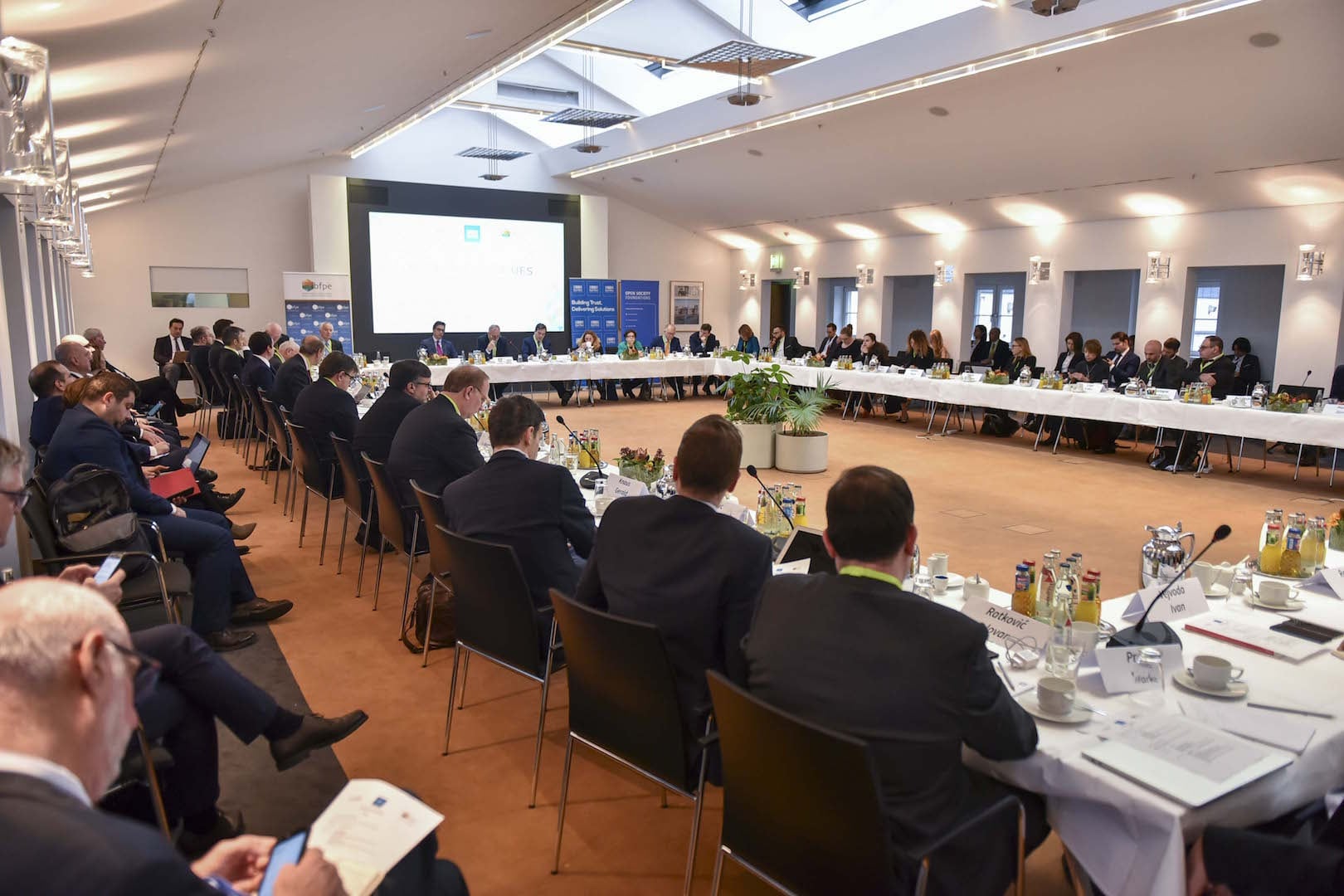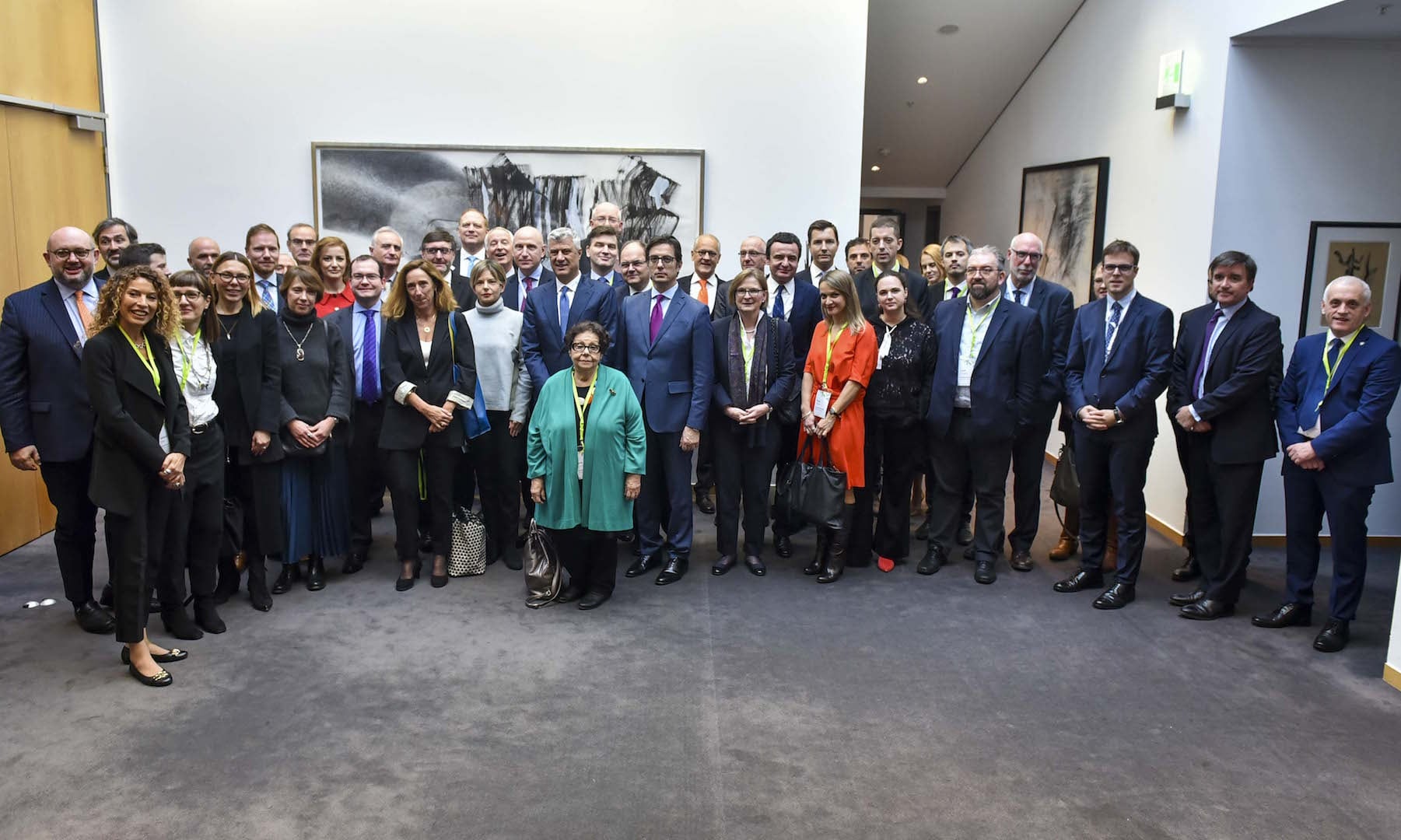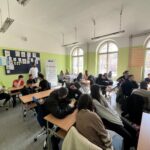Photos: Kristijan Georgievski
When the organizers of “Balkan Dialogues” – EastWest Institute, Belgrade Fund for Political Excellence and Munich Security Conference – with the support of Balkan Trust for Democracy and Open Society Foundations Europe planned the event that was held in Berlin on 5-6 December, they felt a degree of emergency, taking into account all that has happened: the “French” veto, Brussels dialogue all but ending, absence of consensus between European Union (EU) member states on many issues (not only enlargement perspective). Discussions held in Berlin, served as a “stocktaking exercise”, a way to determine where we are at the moment, and what are the chances for progress in 2020, whether it is opening of accession negotiations for North Macedonia and Albania or reaching a comprehensive agreement between Belgrade and Pristina.

ACCOUNTABILITY BEFORE WELL-BEING: First impression is that all the participants are aware of the demographic crisis, with many people leaving Western Balkans; not (only) because they are economically threatened, but because they feel unsatisfied with the general state of affairs in society. One of the participants referred to poll results showing how, for citizens who are not party affiliated, “rule of law and accountability” comes before jobs and economic well-being. Second participant quoted his daughter, who said to him that things in the Balkans “aren’t changing fast enough” for her generation. That processes from the 90s are considered “irreversible“ or that things “can’t be worse than they are” was with rightly defined as a “myth”. Finally, for one of our panelists, backsliding is the “reason why we have gathered in the first place”.
Second impression: utmost concern that the “European perspective” is brought into question. One of our introductory speakers pointed out how at multiple meetings in European capitals, the “European Economic Area – EEA” model was offered as an alternative to full-fledged membership. Current situation is that there are two countries which are in negotiation process (Montenegro and Serbia), two that are hoping to open negotiations (Northern Macedonia and Albania) and two that are “forgotten” (Bosnia and Herzegovina and Kosovo). While some are scared that they will stay forever “locked” in negotiation process like Turkey, others compared enlargement policy with Cold War containment. EU, while leading such policy, will never become the “geopolitical actor”, capable to respond to global challenges and challengers; despite the ambition announced by the newly appointed President of the European Commission. The EU also risks being perceived as unjust to Albanians (not opening the negotiation process, Kosovo without visa liberalisation, negative prejudices, etc.)
Third impression: even though both parties agree that dialogue (between Belgrade and Pristina) should continue, they look differently on its nature, content and purpose. Starting assessment is that we can hope of reaching an agreement only within the context of European integration – which for Kosovo remains questionable. One of the speakers proposed the much-discussed “two Germanies” model, which does not take into account explicit recognition, or correction of borders; and insisted on improvement of economic cooperation. Second warned that the international community is heading towards failure, one similar to 2007, when the Troika could not come out with a common stance. Third called on the unity of the Quint, where full cooperation between the US and EU member states should be established, with Washington assuming a leading role. Fourth speaker, who went through difficult negotiations himself, cautioned against activities that are in opposition to the desired goal (de legitimization of the other side’s position) and advised for the situation to be observed from “someone else’s shoes”. Particularly interesting were short interventions by two participants from Kosovo – one asking what is the (perceived, desired) endgame, and the other stating how, unlike Serbia, Kosovo is not in position to “wait” because it is “completely isolated”. In the meantime in Serbia and Kosovo as well, effort is not invested to prepare the public for compromise whatever it may entail.
PRO ET CONTRA “THE COMPROMISE”: Confrontation of stances between Albin Kurti, one of the winners of the recently held elections, expected to be the new prime minister of Kosovo government; and Marko Djuric, Director of the Office for Kosovo and Metohija caused the most attention. As we have underscored in a written statement for “Danas” newspapers, they met each other for the first time and communicated in a civilised manner; their dialogue was based on arguments, although it was clear that their initial positions are (very) distant. One impression is that Belgrade seems more open to quick continuation of negotiations as it seeks “tangible compromise”; while the winners of elections in Pristina start from principles, stating what is unacceptable. Dialogue with Belgrade seems not as the first priority, but “justice and jobs”. Kurti – to come out of the confines of “Chatham House” rule only on this issue – did not say that he “does not want Vučić at the table” as several media outlets have reported, but that one of the principles is “no presidents with maps around the table” referring to border corrections.
Fourth: (still, in spite of everything) great expectations from the EU, or leading member states. France and Germany must take a clear stance towards the enlargement (policy); time is of the essence. EU is still that “external evaluator” without whom there is no progress. One experienced diplomat noticed that even though French “blockade” disappointed many, simultaneously France brought enlargement back to the center of the attention. There are big expectations from the new Commission: already in January it must come out with its response on French non-paper in which contours of new methodology will be set out. The question is will that new methodology be valid for all, including two countries which are seven (Montenegro), and five years (Serbia) in negotiation process. Also, whether part of the “new package” will be access to the cohesion funds, expected to be more generous than the pre-accession funds. Idea of “Europe as utopia” is still needed, but her credibility is seriously damaged.
PROPOSALS FROM “THE WB SIX”: What suggestions did our participants make? Before everything else, that decision-making process in the EU’s foreign policy – “if we want to be respected by others in the future” must be changed to qualified majority principle. In “conference about Europe’s future”, which Germany and France jointly announced for 2020/21, “the six” from Western Balkan must participate (as well policy community of experts, researchers and activists). Cohesion funds must open for “the WB Six”, in hope that on the eve of accession, they will be at 60-70% of economic convergence (and standard of living) of the EU average. In return, conditionality policy in those areas, which are the most directed at rule of law, must be “revived”. More money would be at disposal, as now it is highly needed; and less needed later in the process. The idea that capitals of Western Balkans are “ours, European” must be reaffirmed. One of the participants stated how saying that “the problem is only in the methodology (of enlargement)” is also a “myth”, pointing out on lack of political will in member states.
When it comes to the Belgrade-Pristina dialogue, which in the end does not have to be “final” (because for many around the table interim solution would be acceptable), collective reflection of process is needed, as it is clear that mistakes have been done.
From politicians who are sitting in those capitals it is expected to “stop using their alliances with third actors as counterweight” in relations with the EU, or their neighbours. Harmonising foreign policy with that of the EU was mentioned in context of Serbia’s close relations with Russia and China. Following Cyprus’s accession, it is clear that the EU will “never again” accept a country which has an open territorial dispute with one or more neighbours.
“OUT OF THE BOX” IDEAS: Several participants brought up interesting “out of the box” ideas: what if the EU gives up on Western Balkans, how would governing structures then act? Could such an ambitious plan be imagined, under which “the WB Six” would in 2020 jointly present their candidature, not for full-fledged membership, but membership in single market? Can Serbia reach Bulgaria’s levels on funds granted in order to set up parity with what is coming from China? Perhaps expected, there was no immediate answer to these questions.
We conclude with two striking quotes – “if somebody told me during the 90-ties, that in 2019 in Berlin, we would organize ‘Balkan Dialogues’, where ‘Europeans’ are talking with us, instead all of us together talking about the future of Europe, I wouldn’t believe him”; and the second one – “do you think that China or somebody else will wait for us to reform our enlargement policy?” – which perfectly shows, both relations and concerns present in the Western Balkans, one political region constructed by the EU itself.
First published in Novi magazin no. 450 on 12 December 2019; translated by Stefan Boskovic, BFPE













